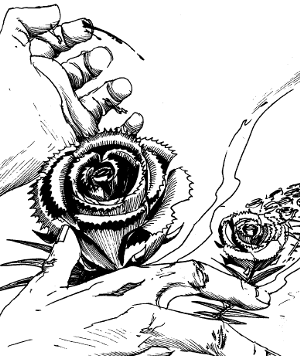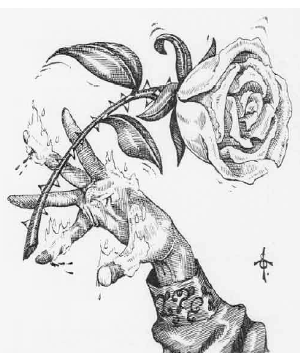
First � Previous � Index � Random • Contents � Next � Last
Firethorn
9449

| Climate/Terrain: | Grasslands, saltwater swamps |
|---|
| Frequency: | Rare |
|---|
| Organization: | Clusters |
|---|
| Activity Cycle: | Any |
|---|
| Diet: | Nutrients |
|---|
| Intelligence: | Non- (0) |
|---|
| Treasure: | Nil |
|---|
| Alignment: | Neutral |
|---|
| No. Appearing: | 20-200 |
|---|
| Armor Class: | 8 |
|---|
| Movement: | 0 |
|---|
| Hit Dice: | 6 |
|---|
| THAC0: | 15 |
|---|
| No. of Attacks: | 1d10 |
|---|
| Damage/Attack: | 1d2 + special |
|---|
| Special Attacks: | Poison, fire |
|---|
| Special Defenses: | Confusion, immune to fire |
|---|
| Magic Resistance: | Nil |
|---|
| Size: | M (4� radius) |
|---|
| Morale: | Average (8-10) |
|---|
| XP Value: | 1,400 |
|---|
 The firethorn, or sea rose, is a rare plant which only grows along tropical or subtropical sea coasts. The only place it is known to grow in abundance is on some of the islands of Zakhara. Firethorns can be found scattered in seasonal grasslands but more commonly spread in clusters to form dense, matted carpets in saltwater swamplands. Resembling nothing so much as squat, broad rose bushes, firethorns produce about twenty brilliant scarlet blooms per plant. Each bloom has its attendant thorns (from 1 to 10 of them). There are no thorns on the main branches of the bush, nor are there any on the flower stems except near the bloom. Sea roses have a distinctive, heady perfume which is noticeable several hundred feet away.
The firethorn, or sea rose, is a rare plant which only grows along tropical or subtropical sea coasts. The only place it is known to grow in abundance is on some of the islands of Zakhara. Firethorns can be found scattered in seasonal grasslands but more commonly spread in clusters to form dense, matted carpets in saltwater swamplands. Resembling nothing so much as squat, broad rose bushes, firethorns produce about twenty brilliant scarlet blooms per plant. Each bloom has its attendant thorns (from 1 to 10 of them). There are no thorns on the main branches of the bush, nor are there any on the flower stems except near the bloom. Sea roses have a distinctive, heady perfume which is noticeable several hundred feet away.
Combat: Though not intelligent, sea roses have three possible modes of self-defense. Anyone plucking one of the blooms or brushing against one is subject to attack by one to ten thorns that spring out at the offending creature, doing 1d2 points damage each. Two saving throws must then be made. A saving throw vs. paralyzation determines whether the thorns will inflict 1d3 points of fire damage per thorn (magic which protects against fire negates this damage). The second saving throw is made to resist the sea rose�s extremely virulent poison: failure means immediate death, while success reduces the injury to 20 points of damage. Only one save vs. poison and one save vs. paralyzation are needed even if multiple thorns hit.
The scent the plants exude is also a powerful defense. Anyone approaching within ten feet must make a saving throw vs. poison or be affected by it. Those affected act as if under a confusion spell for 2 to 8 minutes. This may cause them to come into contact with the plant by accident, thus setting in motion its thorn attacks. When traveling through an area which has several plants, only one save per half-hour spent in the terrain is needed. Subsequent saves in the same area are at a cumulative +1 bonus as those affected build up a short-term resistance. Sea roses trap and hold heat from the sun and are immune to both mundane and magical fire.
Habitat/Society: It is unknown whether the sea rose is a naturally occurring plant or the result of some botanically inclined wizard�s experimentation. The one place in Zakhara where they exist in great numbers is on the Island of Firethorns, a part of the Corsair Domains. Sometimes confused with the legendary roses of forgetfulness because of their confusion properties, firethorns are actually more like weeds than garden flowers. They resist being transplanted and cultivated, though they self-pollinate and spread over large areas when conditions are right.
Perhaps their most intriguing quality is the glow they emit at night. Storing heat from the sun, the blossoms of the plant glow like banked embers in the dark. The heat given off from a single firethorn bush is about equal to that of a small lantern. Several bushes together emit about as much heat as a bonfire. They only radiate heat at night, with the excess warmth being stored in their thorns until evening, leading some people to speculate that this heat exchange is somehow necessary to their growth and propagation. Firethorns respond normally to druidical spells which relate to plants.
Ecology: Aside from their role in anchoring soil in salt swamplands, firethorns can be harvested (carefully) for several products. Chief among these is the beautiful scarlet dye which can be made from the blossoms. This is easily mixed with other ingredients to produce an array of colors from pale pink to deepest crimson; it is the city of Hawa�s chief export. The blossoms also produce an attar which can be used in making a heady perfume or, when correctly rendered, as an ingredient for a potion of dreaming. The thorns from an entire bush provide 1 to 6 doses of type E poison, but the toxin breaks down into a harmless substance after about a week.
Last Modified: September 08, 2009, 15:04:54 GMT

First � Previous � Index � Random • Contents � Next � Last
◆ 699 ◆
 The firethorn, or sea rose, is a rare plant which only grows along tropical or subtropical sea coasts. The only place it is known to grow in abundance is on some of the islands of Zakhara. Firethorns can be found scattered in seasonal grasslands but more commonly spread in clusters to form dense, matted carpets in saltwater swamplands. Resembling nothing so much as squat, broad rose bushes, firethorns produce about twenty brilliant scarlet blooms per plant. Each bloom has its attendant thorns (from 1 to 10 of them). There are no thorns on the main branches of the bush, nor are there any on the flower stems except near the bloom. Sea roses have a distinctive, heady perfume which is noticeable several hundred feet away.
The firethorn, or sea rose, is a rare plant which only grows along tropical or subtropical sea coasts. The only place it is known to grow in abundance is on some of the islands of Zakhara. Firethorns can be found scattered in seasonal grasslands but more commonly spread in clusters to form dense, matted carpets in saltwater swamplands. Resembling nothing so much as squat, broad rose bushes, firethorns produce about twenty brilliant scarlet blooms per plant. Each bloom has its attendant thorns (from 1 to 10 of them). There are no thorns on the main branches of the bush, nor are there any on the flower stems except near the bloom. Sea roses have a distinctive, heady perfume which is noticeable several hundred feet away.

